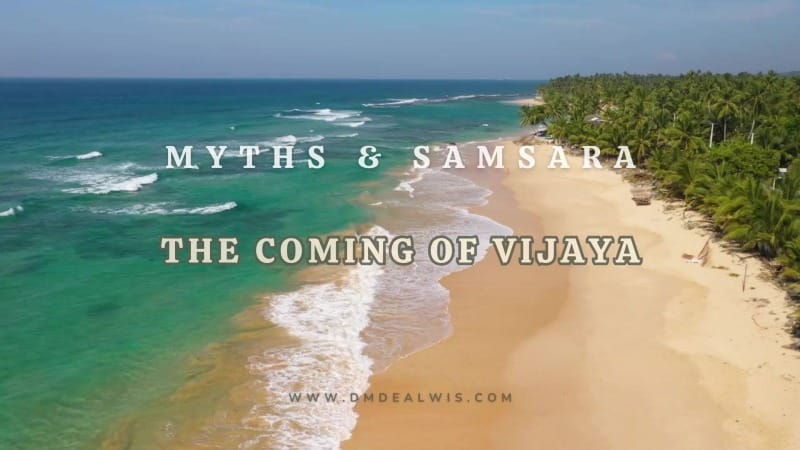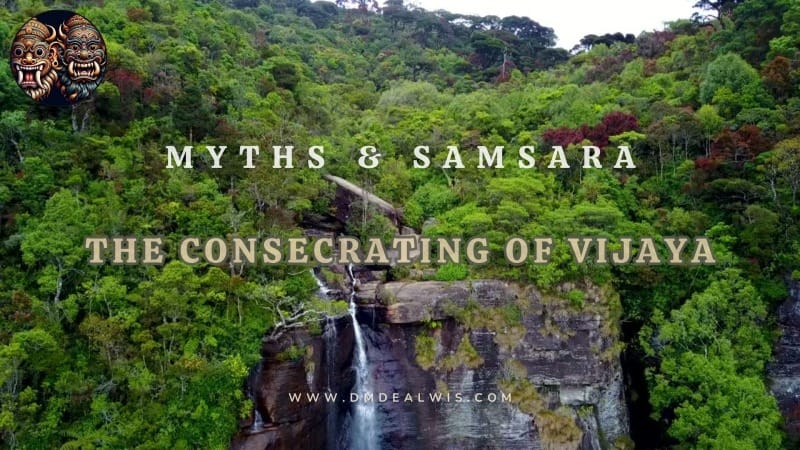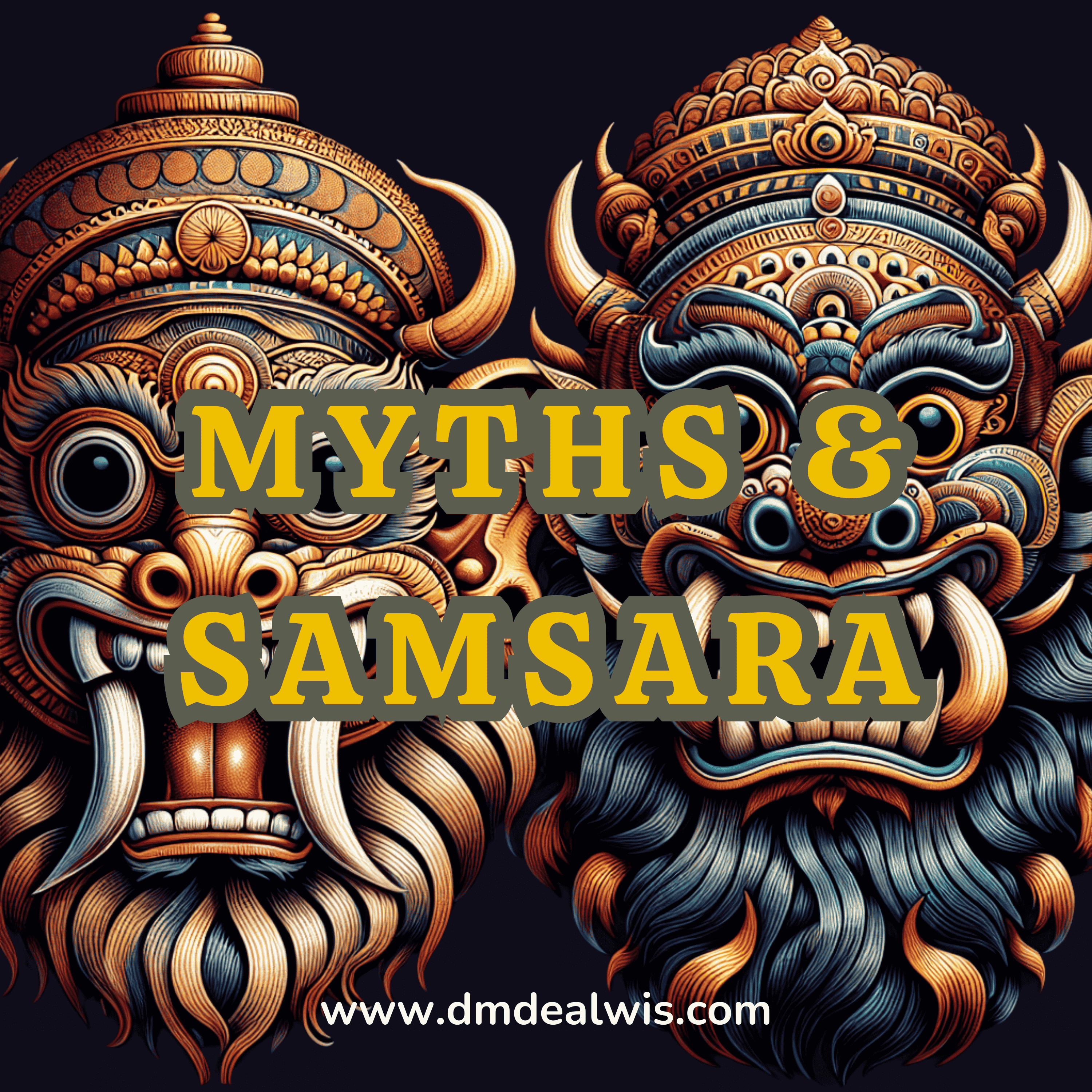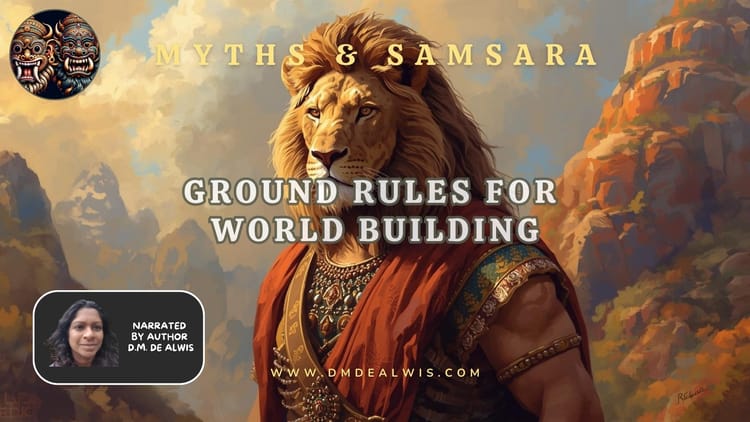002 | Vijaya's Story on Myths & Samsara
Reading Book IX of the Dipavamsa - Vijaya's Story
In this episode, I read an exerpt from the Dipawamsa, the first chronicle of Sri Lanka.
This chronicle is considered the earlier of the two known chronicles of Lanka, suspected to be compiled by Buddhist nuns in the 4th century CE. I like this version because it is simpler, containing less information, and serves as a basis for the oral tradition later incorporated into the Mahavamsa.
The Mahavamsa is steeped in bias that shores up the royal lineage of Lanka at the time when it was written down.
The Dipavamsa was first edited and translated into English by Hermann Oldenberg in 1879. This version was revised by the Pali text society in 2000 and again by the Buddhist monk, Ānandajoti Bhikkhu, in 2017.
Vijaya lived around the time of the Buddha's death in 480 BCE, 1000 years before the oral history was chronicled.
King Vijaya is considered the first Sinhala King of Sri Lanka. (Kings and Chieftains existed before his arrival to Lanka.) Sadly, his children did not rule after his death. His Kingdom passed to his nephew (the son of his twin brother Sumitta) and then later to that nephew's grandchild. His legacy was not stable after his time. Vijaya's one time wife and lover, Kuwena is considered a legend.
What interests me is Vijaya's parentage, and grand parentage. Here lies the basis for my novels. Why do I write about a lion?
- That Vijaya's grandfather is simply called Sīha (or Sinha). See A Lion's Head.
- That his grandmother simply leaves her lion husband to marry a cousin.
- That his father, Sīhabahu, should betray and kill the lion (from the Mahavamsa version).
- That Vijaya is a disreputable terrible guy.
- The decline of the Yaksha in Lanka and the takeover by Vijaya's people, establishment of cities and towns. The colonization of existing peoples.
- The role of the Gods (Sakka) in Vijaya's journey and Kingship and how they are called upon to protect the island of Lanka. This has been misread as protecting Vijaya, I read it as protecting the existing people from someone terrible.
Subsequent translations and readings of these texts have been pulled by the biases of the readers who desired to elevate the Sinhalese nationalistic movement or to establish the old Kingdoms of Sri Lanka to draw respect from Western colonizers.
“Even Buddhism was filtered through the West, I am a product of that myself.” - Gananath Obeyesekere (1930-2025), Anthropologist of religion and Professor of Anthropology at Princeton University.
English Transcript
Here is a copy paste of the English version from https://ancient-buddhist-texts.net/Texts-and-Translations/Dipavamsa/09-Vijaya.htm.
1. The island of Laṅkā was called Sīhala after the Lion (sīha); listen ye to the narration of the origin of the island which I (am going to) tell.
2. The daughter of the Vaṅga king cohabited in the forest with a lion dwelling in the wilderness, and in consequence gave birth to two children.
3. Sīhabāhu and Sīvalī were beautiful youths; the name of their mother was Susimā, and their father was called the Lion.
4. When their sixteenth year had elapsed, (Sīhabāhu) departed from his cave, and then built a most excellent town called Sīhapura.
5. The son of the Lion, a powerful king, ruled over a great kingdom, in Lāḷaraṭṭha, in the most excellent town of Sīhapura.
6. Thirty-two brothers were the sons of Sīhabāhu; Vijaya and Sumitta were the eldest among them, beautiful princes.
7. Prince Vijaya was daring and uneducated; he committed most wicked and fearful deeds, plundering the people.
8. The people from the country and the merchants assembled; they went to the king and complained against the bad conduct of Vijaya.
9. The king, having heard their speech, full of anger, gave this order to the ministers: “Remove ye that boy.
10. Let them remove from the country all those attendants, his wives, children, relations, maid-servants, man-servants, and hired workmen.”
11. He was then removed, and his relations were separated from him; so they went on board ship, and (the ship) sailed away on the sea.
12. “May they drift wherever they like; they shall not show their faces again nor shall they ever come back to dwell in our kingdom and country.”
13. The ship in which the children had [161] embarked was helplessly driven to an island, the name of which was then called Naggadīpa.
14. The ship in which the wives had embarked was helplessly driven to an island, the name of which was then called Mahilāraṭṭha.
15. The ship in which the men had embarked went, sailing on the sea, losing her way and her bearings, to the port of Suppāra.
16. The people of Suppāra then invited those seven hundred men to disembark, and offered them lavish hospitality and honours.
17. During this hospitable reception Vijaya and all his followers unnoticed (?) committed barbarous deeds.
18. They made themselves guilty of drinking, theft, adultery, falsehood, and slander, of an immoral, most dreadful, bad conduct.
19. (The people) indignant at such cruel, savage, terrible and most dreadful deeds being committed against themselves, consulted together: “Let us quickly kill those rascals.”
20. There is an island (formerly) called Ojadīpa, Varadīpa, or Maṇḍadīpa, the (recent) name of which is Laṅkādīpa, and which is (besides) known by the name of Tambapaṇṇi.
21-22. At the time, when Sambuddha, highest of men, attained Parinibbāna, that son of Sīhabāhu, the prince called Vijaya, having left the land called Jambudīpa, landed on Laṅkādīpa. It had been foretold by the most excellent Buddha, that that prince one day would be (its) king.
23. The Teacher at that time had addressed Sakka, the chief of gods: “Do not neglect, Kosiya, the care of Laṅkādīpa.”
24. Sujampati, the king of gods, having heard the Sambuddha’s command, committed to Uppalavaṇṇa the business of guarding the island.
25. Having heard the command of Sakka that powerful Devaputta with his attendant demons kept guard over the island.
26. Vijaya, having stopped three months at Bhārukaccha and exasperated the inhabitants, went again on board his ship.
27. That crowd of men having gone on board their ship, sailing over the sea, were driven away by the violence of the wind, and lost their bearings.
28. They came to Laṅkādīpa, where they disembarked and went on shore. Standing on dry ground, being exhausted [162] by great hunger, thirst and fatigue, they were unable (?) to walk on foot.
29. They crawled about on the ground with both hands and knees; afterwards, when they rose and stood upright, they saw that their hands were resplendent (copper-coloured).
30. The red-coloured dust of the ground covered their arms and hands; hence the name of that place was called Tambapaṇṇi (copper-palmed).
31. Tambapaṇṇi was the first town in the most excellent Laṅkādīpa; there Vijaya resided and governed his kingdom.
32. Vijaya and Vijita together with Anurādhanakkhatta, Accutagāmi, and Upatissa are those who came first to this country.
33. Many people, crowds of men and women, came together; (hence each) prince founded a town in the different parts.
34. The town of Tambapaṇṇi surrounded by suburbs was built by Vijaya in the south on the most lovely bank of the river.
35. Vijita founded Vijita(pura), the same founded Uruvelā. The minister who was called after the asterism (Anurādha) founded Anurādhapura.
36. He who was called Accutagāmi then founded Ujjenī, Upatissa founded Upatissanagara which had well arranged markets, which was prosperous, opulent, large, charming, and lovely.
37. The king called Vijaya by name was the first ruler who reigned in Tambapaṇṇi over the delightful island of Laṅkā.
38. When seven years (of his reign) had passed, the land was crowded with people. That prince reigned thirty-eight years.
39. In the ninth month after (Gotama) had become Buddha, the host of Yakkhas was destroyed; in the fifth year after his attaining Buddhaship the Jina conquered the Nāgas; in the eighth year after his attaining Buddhaship he completed the Samāpatti meditations (in Laṅkā).
40. On these three occasions the Tathāgata came hither. In the last year of the Buddha Vijaya came hither.
41. The Sambuddha, the most excellent of men, made (the island fit for) the residence of men; the Sambuddha (afterwards) reached complete Nibbāna by the entire annihilation of the substrata of existence. [163]
42. Prince (Vijaya) reigned thirty-eight years after the Parinibbāna of the Sambuddha, the light-giving king of Truth.
43. He despatched a messenger to Sīhapura to the (prince) called Sumitta, (with this message): “Come one (of you) quickly to us, to the most excellent island of Laṅkā; –|
44. there is nobody to govern this kingdom after my death. I hand over to you this island which I have acquired by my exertions.”
Subscribe to the Myths & Samsara podcast on YouTube (Visual), Apple Podcasts, Spotify, Amazon Music, and Pandora.
More on King Vijaya...










Member discussion